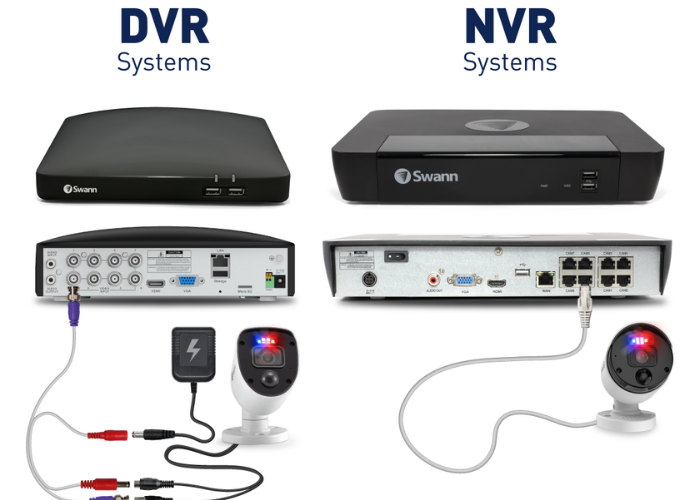
When picking a video surveillance system, you’ll often find two main types, NVR (Network Video Recorder) and DVR (Digital Video Recorder).Both record videos for security, but they work differently and have their own features. Here’s a simple look at what makes NVR and DVR different to help you pick the best one for your needs.
DVR systems work with analog security cameras by converting their video into a digital format for recording. They need coaxial cables for each camera, which can make the setup more complex, especially in bigger areas. DVRs are popular because they’re simple and reliable, making them ideal for smaller places where wiring isn’t too difficult.
NVR systems work with IP cameras that connect directly to your network, recording video in digital format right from the start. The setup is easier because Ethernet cables are used for both power and data, known as Power over Ethernet (PoE). NVR is more flexible than DVR, as it works well with modern networks and wireless cameras.
NVR systems offer higher video quality because they use digital IP cameras, which typically provide better image resolution. DVR systems may have lower video quality, depending on the cameras used. Since analog signals degrade over long distances, this can affect image clarity.
NVR is easier to install, especially in larger areas. The PoE feature means fewer cables are needed, and you can even use wireless cameras, eliminating the need to run cables across the building. DVR requires coaxial cables for each camera, which can make installation more challenging, especially if the cameras are far from the recorder.
NVR systems are more scalable because adding more IP cameras to your network is relatively simple. Modern NVRs also often support remote viewing through mobile devices. DVR systems are less scalable since every new camera needs a dedicated coaxial cable, making expansion cumbersome.
DVR systems are usually less expensive up front, especially if you are only using a few cameras. They are great for budget-conscious users who want basic surveillance. NVR systems tend to cost more, mainly because they use newer technology and better-quality cameras. However, the added expense comes with benefits like flexibility and better image quality.
Deciding between NVR and DVR depends on what you specifically need:
If you want high video quality, easy installation, and a system that can grow with your needs, then an NVR system is the better choice. It’s ideal for medium to large installations, where flexibility and higher camera resolution are essential.
If you need simple video recording and have a tight budget, a DVR system might be the better choice. It's best for small properties where installation challenges and image quality are less of a concern.
Both DVR and NVR systems have their benefits. DVRs are budget-friendly and dependable, while NVRs offer better video quality and are easier to expand. The best choice depends on your budget, the area to cover, and future needs.
This is very useful! I need to set up security for my small office, and I think DVR is better since my budget is low. The way you explained the installation and cost was very clear.
Provide clear contact information, including phone number, email, and address.
Nicely explained! I think a DVR will work for my small retail store, but I'm curious about remote viewing. Is it possible with a DVR system, or do I need to go with NVR for that?